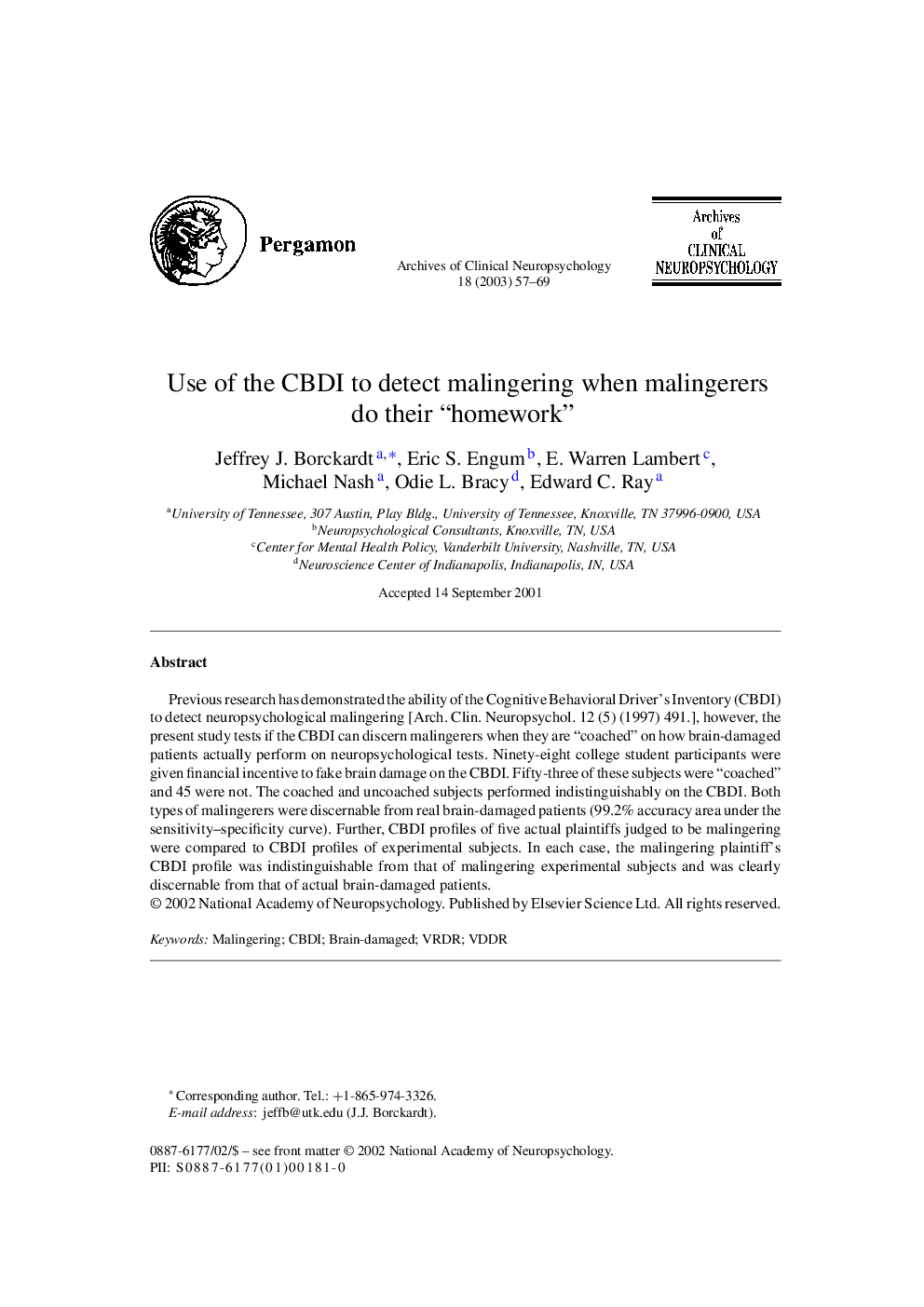Previous research has demonstrated the ability of the Cognitive Behavioral Driver’s Inventory (CBDI) to detect neuropsychological malingering [Arch. Clin. Neuropsychol. 12 (5) (1997) 491.], however, the present study tests if the CBDI can discern malingerers when they are “coached” on how brain-damaged patients actually perform on neuropsychological tests. Ninety-eight college student participants were given financial incentive to fake brain damage on the CBDI. Fifty-three of these subjects were “coached” and 45 were not. The coached and uncoached subjects performed indistinguishably on the CBDI. Both types of malingerers were discernable from real brain-damaged patients (99.2% accuracy area under the sensitivity–specificity curve). Further, CBDI profiles of five actual plaintiffs judged to be malingering were compared to CBDI profiles of experimental subjects. In each case, the malingering plaintiff’s CBDI profile was indistinguishable from that of malingering experimental subjects and was clearly discernable from that of actual brain-damaged patients.
The specialty of neuropsychology has advanced to the degree that neuropsychological opinions as to diagnosis, causation, social and behavioral effect, and damages are now accepted by many courts. While this is certainly appropriate for those conditions for which the neurological lesion or process can be independently verified with alternate neurodiagnostic techniques, many clinical researchers harbor reservations as to the scientific validity of neuropsychological assessment for those conditions where there is no such independent confirmation. The problem is magnified by the fact that neuropsychological opinion is now accepted, if not invited, by courts in many medicolegal contexts such as personal injury litigation, worker’s compensation claims, social security disability determinations, and product liability claims. In addition, neuropsychological testimony is now presented in criminal cases regarding determinations of competency to stand trial, pleas of not guilty by reason of mental disease or defect, diminished capacity due to mental disease or defect, sentencing alternatives, placement within the correctional system, and parole decisions.
Unfortunately, with no independent verification of the underlying neurological lesion or process and neuropsychologists attributing clinical significance to increasingly small statistical deviations, the opportunity for malingering increases substantially.
Malingering should be considered a possibility whenever the evaluation results may be related to an opportunity for financial or legal gain for the patient (American Psychiatric Association, 1994 and Binder, 1990). Griffin, Normington, May, and Glassmire (1996) determined that approximately 19% of Social Security Disability claimants in Los Angeles County who underwent psychological disability examinations were judged to be malingering to some significant degree.
There are, of course, numerous studies indicating that unless the clinician specifically assesses the client in a medicolegal context for malingering, dissimulators will typically escape detection (Heaton, Smith, Lehman, & Vogt, 1978). Even 9- to 12-year-old children (Faust, Hart, & Guilmette, 1988) and adolescents (Faust, Hart, Guilmette, & Arkes, 1988), without training or coaching, were capable of successfully faking neuropsychological deficits on a battery of neuropsychological tests analyzed blindly by experienced practitioners listed in the National Register of Health Service Providers in Psychology (who indicated both that they offered services to children of all ages and possessed a specialty in clinical neuropsychology).


